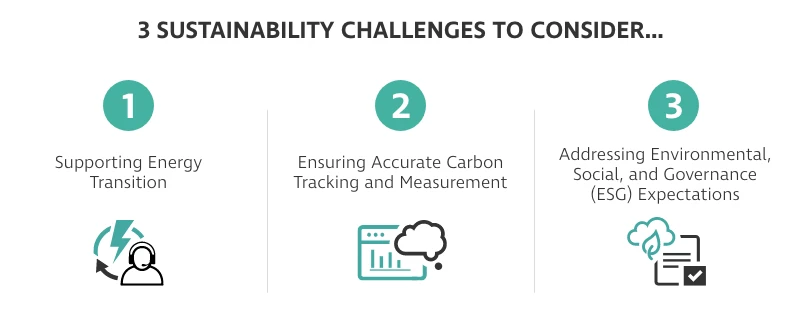Key Takeaways
Fleet sustainability has become an essential focus for fleet operators as businesses strive to reduce their environmental impact and adapt to regulatory and stakeholder expectations. The transition to sustainable practices requires fleet managers to address key challenges, from adopting alternative energy sources to accurately tracking carbon emissions and meeting Environmental, Social, and Governance (ESG) standards.
Table of Contents
- Challenge 1 - Supporting Energy Transition
- Challenge 2 - Ensuring Accurate Carbon Tracking and Measurement
- Challenge 3 - Addressing Environmental, Social, and Governance (ESG) Expectations
Challenge 1: Supporting Energy Transition
The push to transition away from internal combustion engine (ICE) vehicles to alternative energy sources is gaining momentum. Deadlines for adopting electric vehicles (EVs), compressed natural gas (CNG), hydrogen fuel cells, and other alternatives are fast approaching, adding urgency to the need for actionable transition plans.
The Urgency of Transition
Shifting to alternative fuels requires more than acquiring new vehicles. Fleet operators must carefully plan how to integrate these vehicles into operations while minimising disruptions and ensuring that infrastructure investments, such as EV charging stations, align with long-term goals.
What to Look for in Fleet Management Software
Fleet management software should provide tools to evaluate which vehicles are best suited for alternative fuels based on operational data, such as duty cycles and vehicle usage. It should also offer analytical capabilities to calculate total cost of ownership (TCO) comparisons between ICE vehicles and their alternatives, helping fleet managers weigh financial considerations.
Predictive modeling tools can also simulate infrastructure needs for refueling or recharging. This process can assist operators to plan strategically and avoid bottlenecks during the transition process. These capabilities collectively reduce the complexities of transitioning to a more sustainable fleet.

Challenge 2: Ensuring Accurate Carbon Tracking and Measurement
Tracking carbon emissions across a diverse fleet is a critical aspect of green fleet management. For fleets with mixed energy sources—ICE, EVs, and more—accurate data integration and reporting are essential for monitoring progress and identifying opportunities for improvement.
The Complexity of Emissions Tracking
Measuring emissions involves more than tracking fuel usage. It requires detailed insights into factors such as engine idling, driver behaviour, and vehicle performance, which can vary widely across a mixed-energy fleet. Without consistent data collection, emissions reporting can be inaccurate, making it harder to demonstrate reductions or meet compliance standards.
How Fleet Management Software Helps
Fleet management software should seamlessly integrate with all vehicle types, enabling consistent and accurate emissions reporting. It must also analyse data to highlight areas for improvement, such as reducing idle time or optimising driver performance, to further cut emissions.
A solution with intuitive dashboards can make emissions data easily accessible, simplifying reporting for stakeholders and regulatory bodies. These features are essential for tracking progress, showcasing fleet sustainability improvements, and ensuring alignment with sustainable fleet management goals.
Harness the Power of AI for Your Fleet
Discover how Artificial Intelligence is transforming fleet management. Learn how Teletrac Navman's cutting-edge solutions can help you leverage AI to optimise operations, improve efficiency, and gain a competitive edge.
Challenge 3: Addressing Environmental, Social, and Governance (ESG) Expectations
As ESG principles increasingly influence procurement decisions, fleet operators must align their practices with these standards. Beyond reducing emissions, ESG strategies require a focus on driver safety, equitable opportunities, and governance frameworks that ensure ethical and transparent operations.
Why ESG Matters in Fleet Management
Companies are expected to adopt sustainability strategies that extend beyond environmental considerations. Fleet operators must also prioritise workforce welfare and compliance with regulatory standards, making ESG alignment a fundamental aspect of fleet operations.
What Fleet Management Software Should Offer
Fleet management software can support ESG goals by enabling robust environmental strategies through tools for fuel optimisation, energy-efficient operations, and emissions reduction. It can also bolster social initiatives by providing driver training and monitoring tools that improve safety and job satisfaction.
On the governance side, software should simplify compliance tracking by automating processes like inspection monitoring and audit preparation. These capabilities ensure that fleets operate ethically and sustainably, building trust with stakeholders and promoting long-term resilience.
Building a Sustainable Fleet Strategy
As sustainability becomes a cornerstone of modern fleet management, addressing challenges like energy migration, carbon tracking, and ESG compliance is essential. Powerful fleet management software platforms like Teletrac Navman’s TN360 provide the tools to meet these in pursuit of their sustainability goals.
By choosing a platform that aligns with your needs, you can reduce your company’s environmental impact, strengthen your ESG strategies, and create a roadmap for long-term success in sustainable fleet planning. Contact us today to learn more about our award-winning solutions that can support your sustainability efforts.

